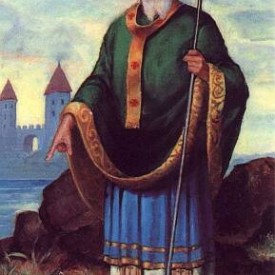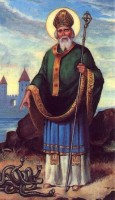Saint Patrick [Patron Saint] of Ireland
Saint Patrick is the Patron Saint of Ireland and is credited with bringing Christianity to Ireland. The celebration of his day is the national holiday in Ireland. Parades and parties generally celebrate the day with lots of music long into the night.
History and legend are intertwined when it comes to St. Patrick. It is known that he was born in Scotland (though this location is often replaced with Northumberland, Wales or Cumbria), kidnapped and sold in Ireland as a slave. He became fluent in the Irish language before making his escape to the continent eventually becoming a bishop. Saint Patrick was a great traveller in the Celtic countries, as many places in Brittany, Cornwall, Wales, Scotland and Ireland are named after him.
Patrick is most known the world over for having driven the snakes from Ireland. Different tales tell of his standing upon a hill, using a wooden staff to drive the serpents into the sea, banishing them forever from the shores of Ireland. One legend says that one old serpent resisted, but the saint overcame it by cunning.
St. Patrick is said to have coxed the serpent into a box and thrown it into the sea. While it is true there are no snakes in Ireland, chances are that there never had been. Many pagan religion’s serpent symbols were common and possibly even worshipped: driving the snakes from Ireland was probably symbolic of putting an end to that pagan practice.
While not the first to bring Christianity to Ireland, it was Patrick who encountered the Druids at Tara, abolished their pagan rites, and converted the warrior chiefs and princes, baptizing them and thousands of their subjects in the Holy Wells that still bear that name. According to tradition St. Patrick died on 17 March in A.D. 493 and was buried in the same grave as St. Bridget and St. Columba at Downpatrick, County Down.


